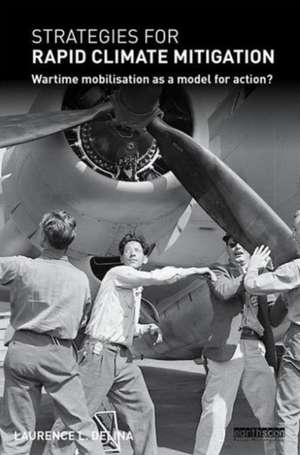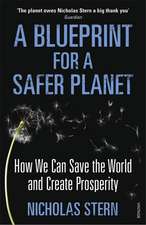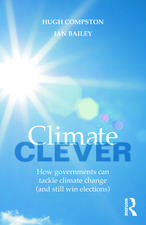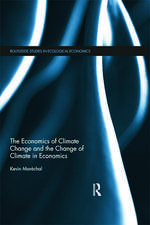Strategies for Rapid Climate Mitigation: Wartime mobilisation as a model for action?: Routledge Advances in Climate Change Research
Autor Laurence Delinaen Limba Engleză Hardback – 9 iun 2016
Strategies for Rapid Climate Mitigation examines the wartime-climate analogy by drawing lessons from wartime mobilisations to develop contingency plans for a scenario where governments implement stringent mitigation programs as an ‘insurance policy’ where we pay for future benefits. Readers are provided a picture of how these programs could look, how they would work, what could trigger them, and the challenges in execution. The book analyses in detail one plausible approach to a crucial issue – an approach built upon knowledge of climate science and on proven and demonstrated mitigation measures. The book is meshed with a social and political analysis that draws upon narratives of mobilisations during the war to meet a transnational threat, while also addressing the shortcomings of the analogy and its strategies.
The book will be of great interest to scholars, students, and practitioners of public policy, climate policy, energy policy, international relations, and strategic studies.
Din seria Routledge Advances in Climate Change Research
- 8%
 Preț: 376.64 lei
Preț: 376.64 lei -
 Preț: 280.92 lei
Preț: 280.92 lei -
 Preț: 320.22 lei
Preț: 320.22 lei -
 Preț: 310.14 lei
Preț: 310.14 lei -
 Preț: 309.87 lei
Preț: 309.87 lei -
 Preț: 311.14 lei
Preț: 311.14 lei -
 Preț: 152.57 lei
Preț: 152.57 lei - 8%
 Preț: 390.79 lei
Preț: 390.79 lei -
 Preț: 207.01 lei
Preț: 207.01 lei -
 Preț: 312.54 lei
Preț: 312.54 lei -
 Preț: 287.02 lei
Preț: 287.02 lei -
 Preț: 295.88 lei
Preț: 295.88 lei -
 Preț: 482.62 lei
Preț: 482.62 lei -
 Preț: 406.42 lei
Preț: 406.42 lei -
 Preț: 478.77 lei
Preț: 478.77 lei - 18%
 Preț: 1000.27 lei
Preț: 1000.27 lei -
 Preț: 449.41 lei
Preț: 449.41 lei -
 Preț: 449.41 lei
Preț: 449.41 lei - 16%
 Preț: 325.34 lei
Preț: 325.34 lei - 18%
 Preț: 1172.58 lei
Preț: 1172.58 lei - 18%
 Preț: 1001.84 lei
Preț: 1001.84 lei - 18%
 Preț: 1074.49 lei
Preț: 1074.49 lei -
 Preț: 408.16 lei
Preț: 408.16 lei -
 Preț: 449.41 lei
Preț: 449.41 lei - 31%
 Preț: 762.58 lei
Preț: 762.58 lei -
 Preț: 408.74 lei
Preț: 408.74 lei -
 Preț: 299.52 lei
Preț: 299.52 lei - 18%
 Preț: 701.56 lei
Preț: 701.56 lei - 18%
 Preț: 1057.09 lei
Preț: 1057.09 lei - 18%
 Preț: 1055.51 lei
Preț: 1055.51 lei - 18%
 Preț: 1053.92 lei
Preț: 1053.92 lei -
 Preț: 416.22 lei
Preț: 416.22 lei - 18%
 Preț: 1053.16 lei
Preț: 1053.16 lei - 30%
 Preț: 847.73 lei
Preț: 847.73 lei - 25%
 Preț: 851.82 lei
Preț: 851.82 lei -
 Preț: 413.94 lei
Preț: 413.94 lei - 18%
 Preț: 1000.27 lei
Preț: 1000.27 lei - 18%
 Preț: 1226.79 lei
Preț: 1226.79 lei -
 Preț: 449.41 lei
Preț: 449.41 lei - 18%
 Preț: 1062.16 lei
Preț: 1062.16 lei - 26%
 Preț: 764.20 lei
Preț: 764.20 lei
Preț: 820.32 lei
Preț vechi: 1140.72 lei
-28% Nou
Puncte Express: 1230
Preț estimativ în valută:
157.02€ • 170.61$ • 131.98£
157.02€ • 170.61$ • 131.98£
Carte tipărită la comandă
Livrare economică 21 aprilie-05 mai
Preluare comenzi: 021 569.72.76
Specificații
ISBN-13: 9781138646230
ISBN-10: 1138646237
Pagini: 208
Ilustrații: 5
Dimensiuni: 156 x 234 x 18 mm
Greutate: 0.48 kg
Ediția:1
Editura: Taylor & Francis
Colecția Routledge
Seria Routledge Advances in Climate Change Research
Locul publicării:Oxford, United Kingdom
ISBN-10: 1138646237
Pagini: 208
Ilustrații: 5
Dimensiuni: 156 x 234 x 18 mm
Greutate: 0.48 kg
Ediția:1
Editura: Taylor & Francis
Colecția Routledge
Seria Routledge Advances in Climate Change Research
Locul publicării:Oxford, United Kingdom
Public țintă
PostgraduateCuprins
Foreword by Hans Joachim Schellnhuber Introduction 1. The age of climate consequences 2. A Rapid Mitigation Project 3. Scale, speed, scope 4. Mobilising funding 5. Mobilising labour 6. Legislations, control, oversight 7. Dilemmas, implications Conclusion
Recenzii
"The most fascinating part of this book is its close look at how wartime mobilization of our industrial sector might actually happen. People have been talking about it for years, but Laurence Delina has actually done the work to figure it out." – Bill McKibben, founder of 350.org, USA
"Strategies for Rapid Climate Mitigation is an important and timely contribution to the urgent debate about the actions required to drive swift and equitable decarbonisation of the global economy. The detailed and thoughtful discussion of key legislative, regulatory, financial, and labour market policies for mobilizing the resources and capabilities required to achieve emergency speed emission reductions is particularly valuable." – John Wiseman, Deputy Director, Melbourne Sustainable Society Institute, University of Melbourne, Australia
"In our age of catastrophe and neoliberal defeatism, this book is a beacon of hope. Laurence Delina uses his fierce intellect and bold vision to demonstrate that a global emergency mobilization against climate change, with states as central actors, is a viable strategy—indeed it may be the only one left. A must read." – Margaret Klein-Salamon, founder and director of The Climate Mobilization, USA
"The world needs to transition to clean, renewable energy as quickly as possible to reduce the health and climate damage inflicted by the combustion age. This excellent new book examines resources and efforts needed for such a transformation, using wartime mobilization as an example. I recommend it highly for students and the public." – Mark Z. Jacobson, Stanford University, USA
"Despite frequent calls for rapid transitions to a lower carbon economy, few people have sought systematically to build on the lessons of the past to sketch out potential scenarios for the future. TheGendanken(thought) experiment that lies at the heart of this book forces us to engage with historical lessons and face up to uncomfortable truths about the role of the state, finance and labour in enabling and accelerating an energy transition to a world in which climate change is more effectively addressed. It is original, provocative and deserves to be widely read." – Peter Newell, University of Sussex, UK. Editor of ‘The Politics of Green Transformations’ (Routledge 2015).
"Delina asks how human societies can tackle the herculean task of recasting energy systems to meet climate change. He successfully sketches the many moving parts involved in a complex socio-technical transition. From sustainable energy technologies to public policies, and from vested interests to systemic inertia, transition looks daunting. In answer, Delina argues for reviving government as a leading agent of change, rather than relying only on the market. Using wartime mobilization history, he shows both the possibilities and limitations of government action. He calls for the creation of new, powerful institutions to help plan and superintend the widespread, rapid take-up of sustainable energy technologies. He also calls for checks on executive power, reflecting modern democratic norms. The book empowers us to imagine how we might arrive at our climate-safe future." – Alastair Iles, University of California Berkeley, USA
"If publics come to demand climate action, as well they might as extreme weather intensifies and surprises multiply, this book offers a model, historically grounded yet applied to contemporary, even future trends. Delina doesn’t just look back for "lessons from history" but projects forward, imagining the possibility of fundamentally challenging the self-destructive, endlessly expansionist order." – Thomas Princen, University of Michigan Ann Arbor, USA
"The most fascinating part of this book is its close look at how wartime mobilization of our industrial sector might actually happen. People have been talking about it for years, but Laurence Delina has actually done the work to figure it out." – Bill McKibben, founder of 350.org, USA
"Strategies for Rapid Climate Mitigation is an important and timely contribution to the urgent debate about the actions required to drive swift and equitable decarbonisation of the global economy. The detailed and thoughtful discussion of key legislative, regulatory, financial, and labour market policies for mobilizing the resources and capabilities required to achieve emergency speed emission reductions is particularly valuable." – John Wiseman, Deputy Director, Melbourne Sustainable Society Institute, University of Melbourne, Australia
"In our age of catastrophe and neoliberal defeatism, this book is a beacon of hope. Laurence Delina uses his fierce intellect and bold vision to demonstrate that a global emergency mobilization against climate change, with states as central actors, is a viable strategy—indeed it may be the only one left. A must read." – Margaret Klein-Salamon, founder and director of The Climate Mobilization, USA
"The world needs to transition to clean, renewable energy as quickly as possible to reduce the health and climate damage inflicted by the combustion age. This excellent new book examines resources and efforts needed for such a transformation, using wartime mobilization as an example. I recommend it highly for students and the public." – Mark Z. Jacobson, Stanford University, USA
"Despite frequent calls for rapid transitions to a lower carbon economy, few people have sought systematically to build on the lessons of the past to sketch out potential scenarios for the future. TheGendanken(thought) experiment that lies at the heart of this book forces us to engage with historical lessons and face up to uncomfortable truths about the role of the state, finance and labour in enabling and accelerating an energy transition to a world in which climate change is more effectively addressed. It is original, provocative and deserves to be widely read." – Peter Newell, University of Sussex, UK. Editor of ‘The Politics of Green Transformations’ (Routledge 2015).
"Delina asks how human societies can tackle the herculean task of recasting energy systems to meet climate change. He successfully sketches the many moving parts involved in a complex socio-technical transition. From sustainable energy technologies to public policies, and from vested interests to systemic inertia, transition looks daunting. In answer, Delina argues for reviving government as a leading agent of change, rather than relying only on the market. Using wartime mobilization history, he shows both the possibilities and limitations of government action. He calls for the creation of new, powerful institutions to help plan and superintend the widespread, rapid take-up of sustainable energy technologies. He also calls for checks on executive power, reflecting modern democratic norms. The book empowers us to imagine how we might arrive at our climate-safe future." – Alastair Iles, University of California Berkeley, USA
"If publics come to demand climate action, as well they might as extreme weather intensifies and surprises multiply, this book offers a model, historically grounded yet applied to contemporary, even future trends. Delina doesn’t just look back for "lessons from history" but projects forward, imagining the possibility of fundamentally challenging the self-destructive, endlessly expansionist order." – Thomas Princen, University of Michigan Ann Arbor, USA
"The most fascinating part of this book is its close look at how wartime mobilization of our industrial sector might actually happen. People have been talking about it for years, but Laurence Delina has actually done the work to figure it out." – Bill McKibben, founder of 350.org, USA
Descriere
Drawing upon episodes of wartime mobilisations, this book lays out contingency climate action strategies based upon the relative optimism provided by rapid deployment of demonstrated and proven sustainable energy technologies that could effectively abate further emissions. While the book makes use of these historical lessons as blueprint for climate strategies, it also critically examines the appropriateness, limitations and challenges of the contingency plan.













